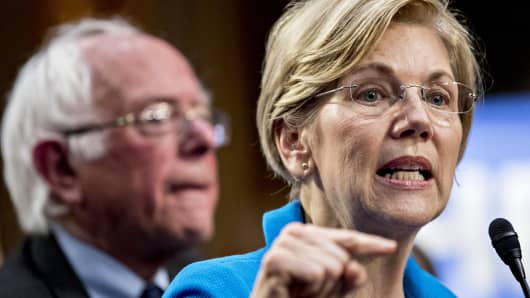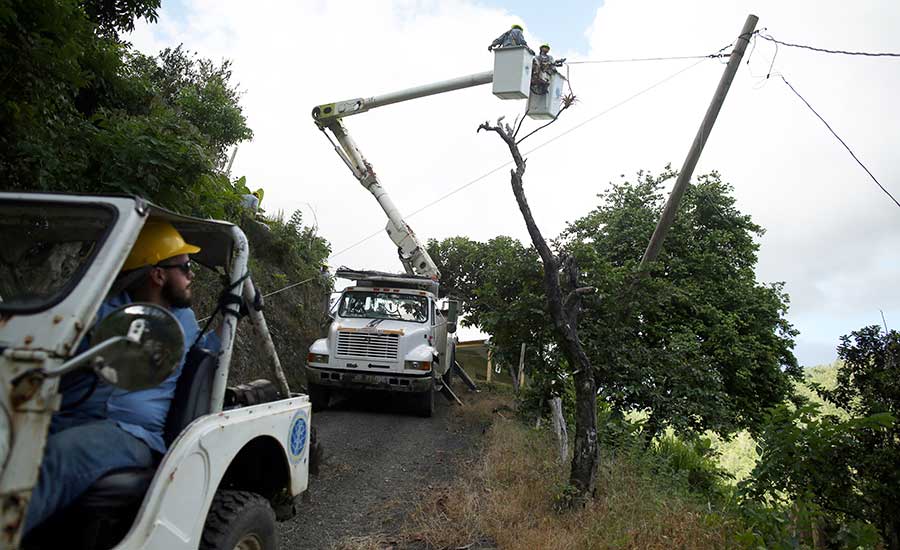Take that!
Investors Capitalist Pigs! That's what you get for investing in a junk bond with sky-high interest rates!
On the other hand: Near-total debt forgiveness, with no attached demand/conditions on political and economic reforms to fix the underlying issues plaguing the island for decades now. That oughtta teach the Puerto Rican government and people how to be responsible, finally!
Senators Warren, Sanders, Gillibrand, Markey, Harris introduce bill that would slash Puerto Rico's $74 Billion debt
By Dawn Giel | 25 July 2018
Sens. Elizabeth Warren and Bernie Sanders on Wednesday introduced a bill that would essentially wipe out tens of billions of dollars of Puerto Rico’s $73 billion in outstanding debt.
The proposal, entitled the “U.S. Territorial Relief Act of 2018,” counts Democratic Sens. Kirsten Gillibrand of New York, Edward J. Markey of Massachusetts and Kamala Harris of California as co-sponsors. The bill “provides an avenue to comprehensive debt relief for Puerto Rico and other hurricane-ravaged U.S. territories so that they have a chance to get back on their feet,” according to the sponsors.
"Greedy Wall Street vulture funds must not be allowed to reap huge profits off the suffering and misery of the Puerto Rican people for a second longer. It is time to end Wall Street's stranglehold on Puerto Rico's future, return control of the island to the people of Puerto Rico and give the territory the debt relief it so desperately needs to rebuild with dignity," said Sanders, I-Vt.
"Puerto Rico was already being squeezed before Hurricane Maria hit and will now have to rebuild under the weight of crushing debt. Our bill will give territories that have suffered an extraordinary crisis a route to comprehensive debt relief and a chance to get back on their feet," said Warren, D-Mass. "Disaster funding and the other resources in struggling territories' budgets must not go to Wall Street vulture funds who snapped up their debt. Congress should pass this legislation right away — our fellow U.S. citizens are counting on us."
The legislation would give Puerto Rico and other U.S. territories the choice to terminate nonpension debt loads if they meet “certain stringent criteria,” according to the bill.
Rep. Nydia Velazquez, D-N.Y., is planning to introduce a companion bill in the House in September.
"After Maria, Puerto Rico needs every tool possible to recover physically and economically. This legislation provides another path for the Island to get back on its feet and begin the journey toward a brighter future,” she said in a statement.
A U.S. territory would have to meet two of three criteria in order to qualify for the debt relief: be the recipient of major federal disaster assistance, have a population decline of 5 percent over 10 years or have per-capita debt exceeding $15,000.
Puerto Rico would almost certainly meet these requirements if the bill were to be signed into law.
The bankrupt island's outstanding bond indebtedness is roughly $73 billion, or nearly $17,000 debt per capita, before Hurricane Maria struck the island in September. The Commonwealth has also projected a cumulative decline in population of 19.4 percent by 2022, according to the island’s fiscal plan.
If Puerto Rico chooses to terminate its debt within three years of the bill being signed into law, $15 billion in federal funds would become available to some of the island’s residents and other creditors whose holdings were terminated.
The Territorial Relief Act of 2018 would use a special master to oversee the $15 billion in the “Puerto Rico Debt Restructuring Compensation Fund.”
Some $7.5 billion would be allocated for Puerto Rican creditors who held the terminated debt, including the island’s residents, banks and credit unions that did business solely in Puerto Rico, the island’s unions and public pension plans, businesses with a principal place of business on Puerto Rico, and anyone else the special master identifies.
Another $7.5 billion would be allocated for creditors on the mainland U.S. who held the terminated debt, including individual investors, trade unions, pension plans, open-end mutual funds that pledge to waive the manager’s fee for any compensation received, and anyone else the special master identifies, according to the bill.
The bill would exclude “hedge funds and their investors, bond insurers, many financial firms with consolidated assets greater than $2 billion, and repo or swaps investors from the distribution,” according to the summary of the legislation.
https://www.cnbc.com/amp/2018/07/25...roduce-bill-that-would-slash-puerto-rico.html





